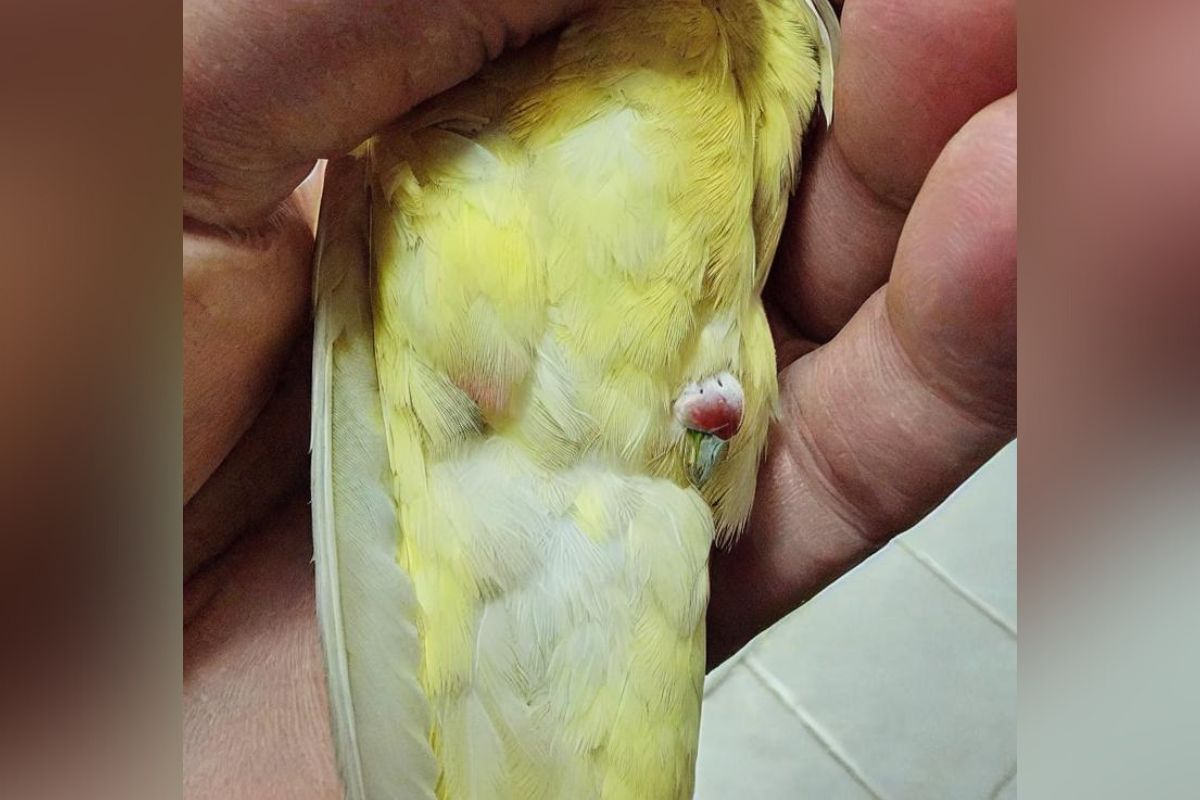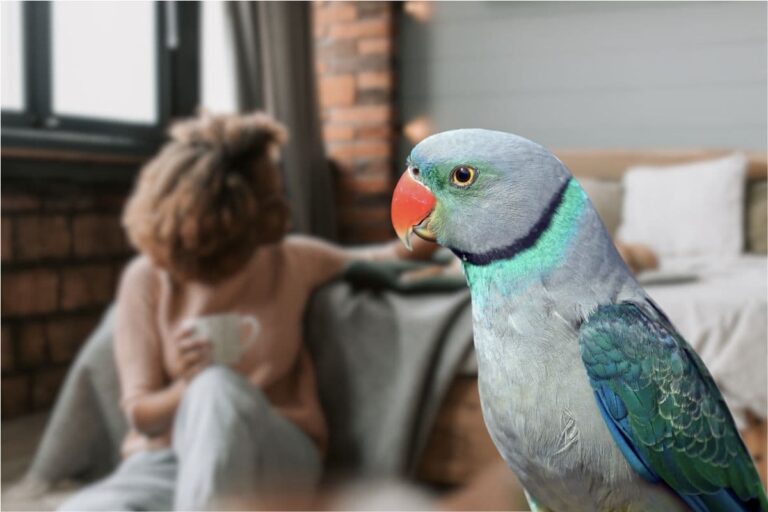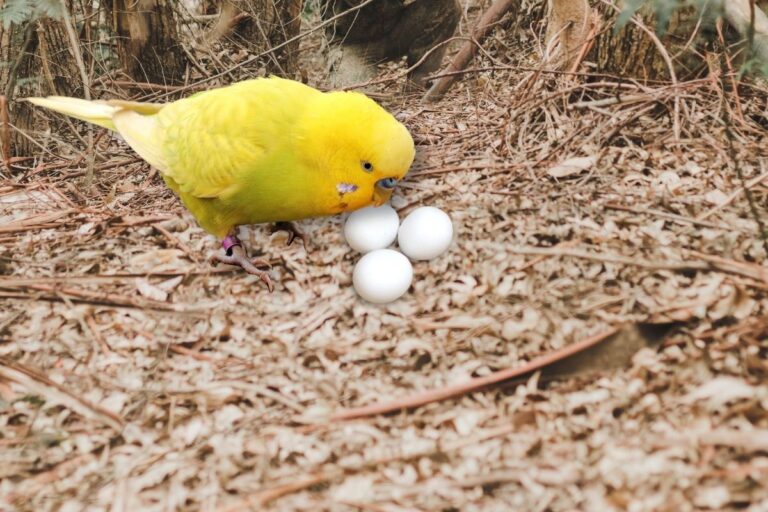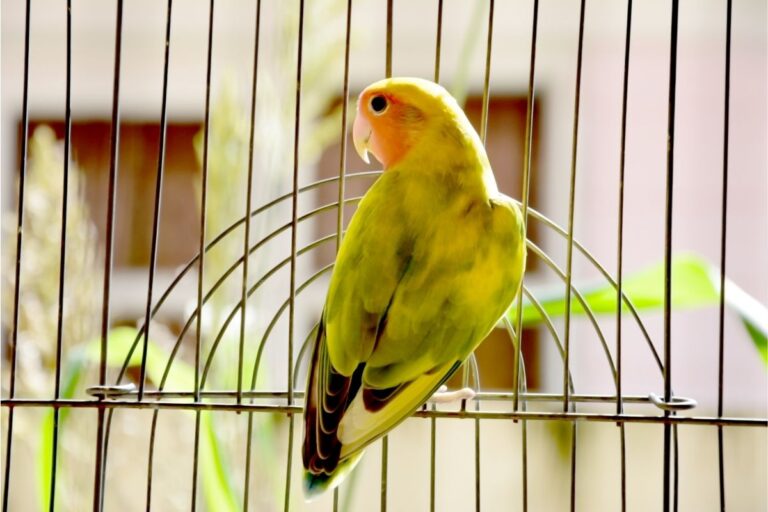Can a Parakeet Get Constipated
Disclosure: The opinions expressed in this post are my own. This post may also contain affiliate links, which means that I will receive a commission if you decide to purchase through my links, at no additional cost to you. As an Amazon Associate, I earn from qualifying purchases.
Do you have a feathered friend that’s been acting a little backed up lately? As a responsible pet owner, it’s important to keep a watchful eye on your beloved bird, and that includes their bathroom habits. So, can a parakeet get constipated? Yes, parakeets can get constipated, and this is a common health issue that can lead to serious complications if not treated promptly.
Constipation in parakeets is usually caused by too much seed or a diet lacking in vegetables and fruits. Dehydration or overeating may also contribute to constipation.
If your budgie is constipated, you may notice that he is lethargic, has a decrease in appetite, or is producing less feces than usual. If your budgie is trying to defecate but nothing is coming out, this is a sign that it is constipated.
How to Tell If Your Parakeet is Constipated?
If you suspect that your parakeet may be constipated, it’s important to recognize the signs and seek veterinary care as soon as possible.
- The first sign of constipation in parakeets is a decrease in the amount of droppings being produced. A healthy budgie should produce several lots of fresh droppings per day; if this reduces or stops, it can be an indication of constipation.
- Another sign of constipation is when the bird has difficulty defecating; unusually small amounts or no feces being produced, even after straining for long periods might be an indication that your bird is suffering from a blockage.
- Your parakeet may also experience pain and discomfort due to the blockage. Look for signs such as restlessness, panting and vocalizing more than usual – all these can indicate distress in birds.
- In addition, your bird’s abdomen may become enlarged or feel firm to the touch; both are indications that something may be wrong internally. Finally, weight loss can occur in cases of chronic constipation.
If you recognize any of these symptoms in your parakeet, seek help from your avian veterinarian immediately so they can determine what type of treatment is necessary.
Why is My Parakeet Constipated?
There are several reasons why your budgie might not be pooping. Let’s take a look at some of the most common reasons.
1. Not Enough Fiber in Diet
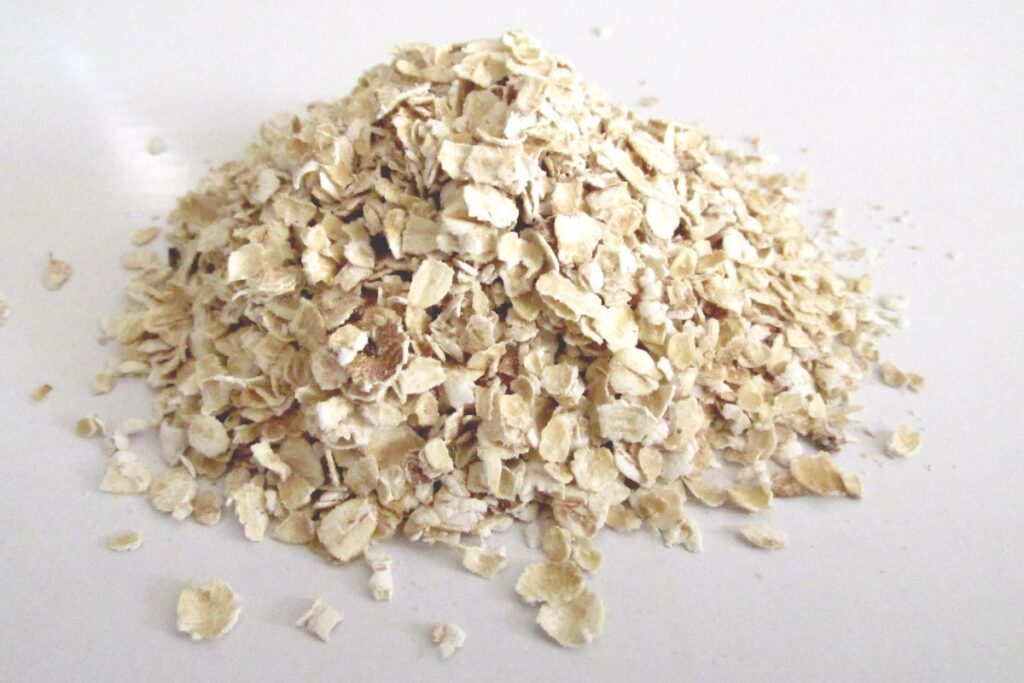
Fiber helps to regulate digestion, and parakeets require high amounts of it for proper digestive health.
A lack of dietary fiber can lead to blockages in their intestines which lead to constipation. Many owners mistakenly feed their parakeets mostly seed-based diets which are low in fiber.
Fiber should make up roughly 20-30% of a parakeet’s daily diet and can be found in most fresh fruits and vegetables. Parakeets love fruits such as apples and pears as well as dark, leafy greens such as kale or spinach. Sprouting seeds is also an excellent way to increase the dietary fiber content in your pet’s diet.
2. Not Enough Oil in Diet
Parakeets can get constipated if there is not enough oil in their diet. This is due to the fact that oils are composed of fatty acids, which help keep the excretory system functioning correctly.
Without enough of these fatty acids, a parakeet’s stools will become dry and difficult to pass. Additionally, if too much seed is offered as part of the parakeet’s diet, this can also lead to constipation due to residue build-up in the gastrointestinal tract.
To prevent constipation in your pet parakeet, make sure they’re getting adequate amounts of oil in their diet through vegetable-based food sources like sunflower seeds or safflower seeds. Additionally, offer regular fruits and vegetables along with a variety of different types of grains to ensure that your parakeet is receiving all the nutrients it needs for optimal health.
3. Lack of Water / Dehydration
Water is essential for a parakeet to stay hydrated and healthy. If there is not enough water available for them, they are at risk for dehydration. Dehydration can cause constipation in parakeets which can occur due to various reasons.
A lack of fresh water in the cage is one of the main reasons why a parakeet may become dehydrated and constipated. It is essential that the bird has fresh, clean water every day so they can stay properly hydrated.
If you are unable to provide enough access to water, it can disrupt your parakeet’s digestive system, leading to constipation and other health issues. Make sure your parakeet always has access to clean, fresh water so they can avoid becoming dehydrated or constipated.
The best way to keep your parakeet hydrated is to make sure he always has fresh water available. A good rule of thumb is to change the water every day, or more often if it gets dirty. You can use a water bottle or a bowl, but make sure the bowl is heavy enough that your bird can’t tip it over.
Parakeets also like to drink from a dripper, so you may want to try one of those as well.
4. Not Enough Food to Eat
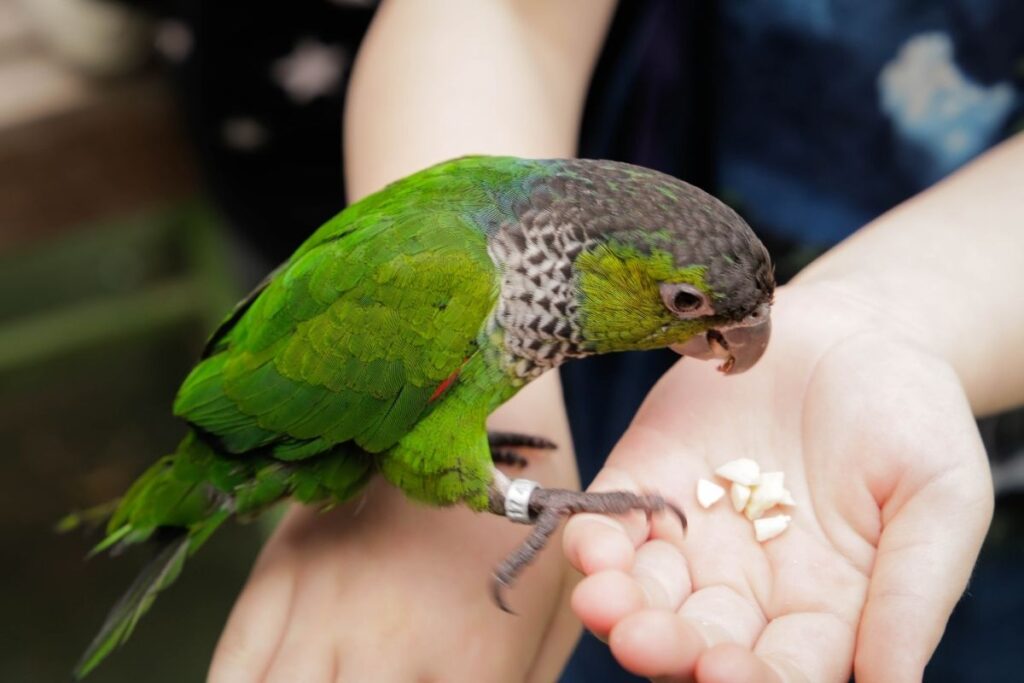
Parakeets can become constipated if they don’t receive enough food. An inadequate diet consists of too few calories and too little variety. This type of nutritional deficiency results in an inability to properly digest food and ultimately creates a blockage in the digestive system.
In order to remedy this condition, make sure that your parakeet is receiving a balanced diet that offers plenty of fresh vegetables, fruits, and unprocessed seeds. They also need vitamins and minerals to get all of the essential nutrients for their growth and development.
Providing your bird with an ample amount of fresh food can help prevent constipation. Monitor how much your parakeet eats each day and if they start to skip meals or eat less than usual, you should consider adding more variety to their diet. A healthy parakeet will generally eat everything that is offered to them so don’t be afraid to give them a boost of nutrition if necessary!
5. Lack of Appetite / Not Eating
Another cause of constipated is a lack of appetite leading to not eating enough. In this instance, constipation occurs because too little food has been consumed to create the necessary fecal matter.
Many factors can lead to a loss of appetite in a parakeet such as stress, illness, boredom or medication. If a parakeet feels unwell or uncomfortable in its environment it may simply stop eating as a result.
It is important to ensure that a parakeet’s diet is varied and interesting so that it receives all the nutrition it needs. Provide your pet with fresh fruits and vegetables as well as bird seed and any other supplements they may require.
If you notice your parakeet’s appetite drastically decreasing then you should take them to the vet immediately. It could be a sign of an underlying medical issue which can be treated if caught early enough.
5. Gastrointestinal Blockages
In some cases, parakeets can suffer from gastrointestinal blockages, which can result in constipation. These blockages are usually caused by an accumulation of feathers or small pieces of food that get stuck in the intestinal tract.
If a bird is constipated due to a gastrointestinal blockage, it’s important to take them to the vet immediately. The vet will carefully examine the bird and may need to do X-rays or ultrasounds to determine the cause of the blockage.
The vet can then recommend treatment options, such as nutritional modifications, medication, medical intervention or surgery if necessary.
If the obstruction is treated promptly and properly there’s no reason why your parakeet should not make a full recovery! Be sure to follow all instructions given by your veterinarian for best results.
What to Do if Your Parakeet Is Constipated?
1. Provide Plenty of Fresh Clean Water
Proper hydration is essential for your parakeet’s health, so provide plenty of fresh, clean water. A water bottle filled with drinking water or a dish with free access to water should appear in his cage consistently.
Encourage your parakeet to drink the fresh water by placing it somewhere easy for him to find and adding some fun toys near the bowl or water bottle. This will make your parakeet more likely to stay hydrated.
This is especially important if you live in a hot climate as it substantially increases the risk of dehydration in parakeets. Regularly clean and replace the water every day.
2. Rub Your Parakeet’s Abdomen with a Warm Wet Cloth
Gently rub your parakeet’s abdomen with a warm, wet soft cloth for about 10 minutes at a time. This will help relax the muscles and get rid of any built-up feces in the intestine.
It’s important to make sure that the water you use isn’t overly hot or cold, as this could harm your parakeet’s skin or make them uncomfortable. Additionally, make sure you move very slowly and gently when rubbing their abdomen so that they don’t become scared or anxious.
3. Offer Your Parakeet Small Amounts of Warm Water
Offering your bird warm water from a teaspoon can be very helpful. The warmth of the water will help to relax their digestive muscles and make it easier to expel the impacted feces.
You have to be patient, and it may take just a few minutes, but it can make all the difference in helping to flush out that impacted feces. Plus, it’s much safer than using laxatives or other harsh treatments that are sometimes suggested for relieving constipation in birds.
4. Give Your Parakeet a Little Coconut Oil

Implementing coconut oil into their diet can help them lubricate their digestive system which relieves constipation. You can give your parakeet coconut oil by incorporating unrefined virgin coconut oil into their diet.
5. Cleaning the Anal Opening
Cleaning the anal opening is one way to get things moving. Take a dab of warm water on your finger and massage it gently around the area. This should help loosen any hardened stool in your parakeet’s system so it can eliminate more easily.
6. Feed Your Parakeet a Nutrient & Fiber-Rich Diet diet
Feeding your budgie the right type of food is essential for its digestive health. If a parakeet doesn’t have enough nutrients in their diet, they may become constipated.
A high quality seed mix, fresh vegetables, fruit, canned foods and pellets tailored specifically for pet birds are important to feed in order to keep them healthy. These foods contain soluble fiber that helps improve digestion and stimulate regular bowel movements.
When feeding your budgie these nutrient-rich foods, make sure to provide them in small portions throughout the day so they get all the nutrients they need without overfeeding.
Final Words
At the end of the day, preventing constipation in parakeets includes staying vigilant about their nutrition needs and overall health.
Make sure to regularly monitor your parakeet’s bathroom habits. If there are sudden changes or your parakeet starts having difficulty going to the restroom, contact a vet for an examination to determine the cause of these changes and any potential medical treatment necessary.



